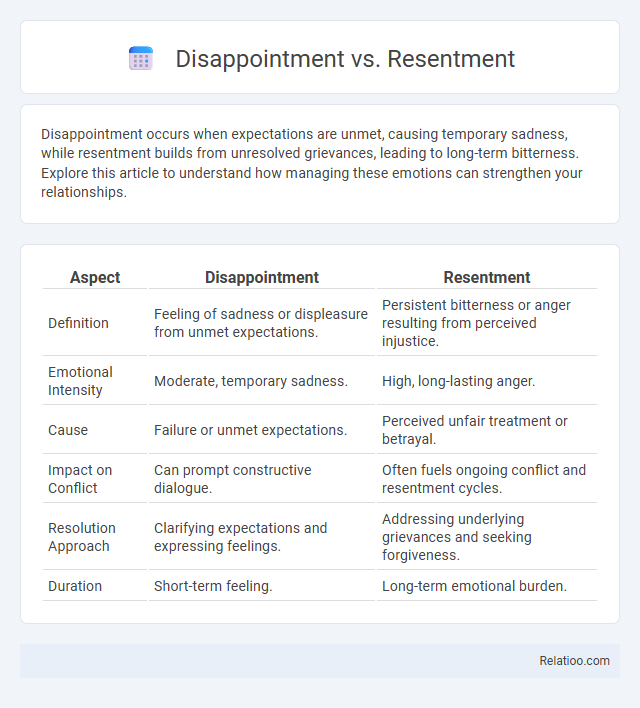Disappointment occurs when expectations are unmet, causing temporary sadness, while resentment builds from unresolved grievances, leading to long-term bitterness. Explore this article to understand how managing these emotions can strengthen your relationships.
Table of Comparison
| Aspect | Disappointment | Resentment |
|---|---|---|
| Definition | Feeling of sadness or displeasure from unmet expectations. | Persistent bitterness or anger resulting from perceived injustice. |
| Emotional Intensity | Moderate, temporary sadness. | High, long-lasting anger. |
| Cause | Failure or unmet expectations. | Perceived unfair treatment or betrayal. |
| Impact on Conflict | Can prompt constructive dialogue. | Often fuels ongoing conflict and resentment cycles. |
| Resolution Approach | Clarifying expectations and expressing feelings. | Addressing underlying grievances and seeking forgiveness. |
| Duration | Short-term feeling. | Long-term emotional burden. |
Understanding Disappointment: Definition and Causes
Disappointment occurs when expectations or hopes are unmet, leading to feelings of sadness or dissatisfaction. It commonly arises from unmet personal goals, broken promises, or unexpected outcomes that conflict with one's desires. Understanding the root causes, such as unrealistic expectations or external circumstances beyond control, helps in managing and mitigating the emotional impact of disappointment.
What is Resentment? A Deep Dive
Resentment is a complex emotional response arising from perceived injustice, unfair treatment, or unmet expectations, often lingering longer than disappointment. It involves a combination of anger, bitterness, and lingering dissatisfaction that can negatively impact mental well-being and relationships if left unaddressed. Unlike disappointment, which is typically a temporary feeling of sadness or frustration over unmet hopes, resentment embeds deeper emotional wounds and can fuel ongoing grudges or hostility.
Key Differences: Disappointment vs Resentment
Disappointment arises from unmet expectations or outcomes, leading to feelings of sadness or frustration, while resentment involves a deeper, more persistent sense of anger and bitterness due to perceived unfair treatment or injustice. Disappointment is often temporary and linked to specific events, whereas resentment builds over time and impacts emotional well-being more significantly. Understanding these differences helps in managing emotional responses effectively and improving interpersonal relationships.
Emotional Triggers: How They Develop
Disappointment stems from unmet expectations, often triggered by situations where outcomes fall short of your hopes, leading to feelings of sadness or frustration. Resentment evolves when you perceive unfair treatment or betrayal, causing lingering bitterness due to unresolved injustice or perceived harm. While disappointment is short-lived and situation-specific, resentment develops over time through repeated emotional wounds and unmet needs, deepening emotional distress.
The Role of Expectations in Both Emotions
Expectations play a crucial role in shaping both disappointment and resentment, with disappointment arising when your anticipated outcome falls short, causing feelings of sadness or frustration. Resentment, however, involves a deeper emotional response where unmet expectations are perceived as unjust or intentional, leading to lingering bitterness. Understanding how expectations influence these emotions can help you manage your reactions and foster emotional resilience.
Impact on Mental Health and Well-being
Disappointment, resentment, and frustration each uniquely impact mental health and well-being by triggering stress and negative emotional cycles that can harm your psychological resilience. Disappointment often leads to feelings of sadness and lowered self-esteem, while resentment fosters bitterness and prolonged emotional distress, which may contribute to anxiety and depression. Frustration causes irritability and tension, hindering your ability to cope effectively with challenges and maintain emotional balance.
Coping Strategies for Disappointment
Coping strategies for disappointment center on acknowledging emotions, practicing mindfulness, and reframing negative thoughts to foster resilience. Developing emotional regulation skills such as deep breathing and journaling can reduce feelings of frustration and prevent escalation into resentment. Seeking social support and setting realistic expectations help manage setbacks constructively, promoting healthier mental well-being.
Overcoming and Managing Resentment
Overcoming resentment requires acknowledging your feelings and identifying the root causes, such as unmet expectations or persistent disappointment. Developing emotional intelligence and practicing forgiveness can help you manage resentment effectively, preventing it from damaging relationships or your mental health. You can cultivate resilience by focusing on open communication and self-compassion, transforming resentment into personal growth and emotional balance.
When Disappointment Turns into Resentment
Disappointment arises from unmet expectations, causing temporary sadness or frustration, while resentment develops when these negative feelings persist and intensify, often fueled by perceived unfair treatment or injustice. When disappointment turns into resentment, the emotional response shifts from passive regret to active bitterness, increasing the risk of prolonged emotional distress and interpersonal conflict. Recognizing this transition early can help address underlying grievances before resentment damages relationships and mental well-being.
Building Emotional Resilience and Moving Forward
Disappointment arises from unmet expectations, while resentment is a deeper, lingering bitterness often tied to perceived injustice. Building emotional resilience involves acknowledging these feelings without letting them define your outlook, fostering self-awareness and adaptability. Moving forward requires reframing negative experiences as growth opportunities, promoting forgiveness, and developing strategies for healthier emotional responses.

Infographic: Disappointment vs Resentment
 relatioo.com
relatioo.com